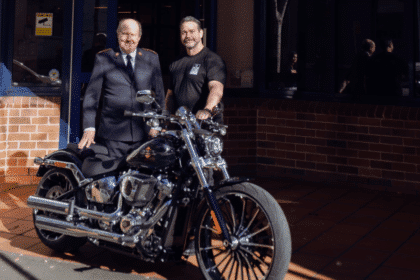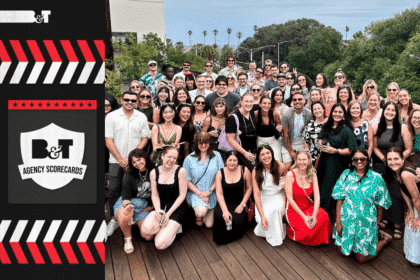Nikolaos Pirounakis is the creative lead at Melbourne’s Bolster Group. However, in June, he will be leaving Victoria to head to the French Riviera to tutor the Cannes Lions Creative Academy.
Last year, Pirounakis attended the Academy as a student and this year, he’s returning to lead the 30-strong class in a discussion about creativity and what it means beyond advertising. B&T sat down with Pirounakis to find out what’s on the prospectus for this year’s course and what students can expect to gain.
Why did you join the Academy last year?
Nikolaos Pirounakis: As a bit of background, I never really had any intentions of getting into the advertising industry per se. I kind of fell into it and learned about all the wild and wonderful ways that creatives can have a fulfilling career in advertising from talking to different people about the opportunities for young talent in the industry.
I had a few colleagues that had previously been through the academy. They came back and had what seemed like a fundamental change in their perspective and thinking and, consequentially, went on to do great things.
What did you enjoy most about the Academy? And was there a corresponding shift in your perspective?
NP: For sure. What was really crazy about Cannes was that it threw convention out the window. Going there was pretty career-defining. There’s obviously a lot to be said about the breadth of talent on show — where else can you find yourself sitting in the same room with all your creative heroes and cracking jokes and exchanging contact details? We were lucky enough to have that access made a reality for us.
That’s what people see on the surface level as the value of the academies. But the real value, and what really changed my perspective, was that there’s a breadth of creative thinking and unique approaches to creativity that come with having such a diverse cohort. It wasn’t just about the people in front of us, it was about the people that were beside us. We were from places all over the world and we’re all still in touch. Not everyone was from adland. There were freelancers, photographers, creatives, filmmakers, people, and designers working for financial institutions and there were so many different perspectives, both culturally and professionally.
Being able to absorb all of that and having those contacts from all over the world in my back pocket to exchange ideas or career advice is a pretty special thing. That really changed my thinking.
Why is it useful to have that diversity in the room and how did that kind of manifest itself?
NP: If we’re talking about the history of creativity, art, design, and writing, a lot of what we’re taught comes from a very traditional Anglo-European school of thought. As designers or writers, or any other creative, we inadvertently subscribe to that through what we’re taught at university and but we very rarely get an insight into what it’s like to grow up learning about advertising and creativity in Brazil or across Africa, for instance.
Our academy dean, Vann Graves, executive director at VCU Brandcenter, has made diversity the cornerstone of this course and bringing unique, varying, and novel perspectives to creativity. He has also cultivated a feeling that all are welcome in the room and there is no judgement. By the end of that week, we were the tightest family you could ever really imagine!
We were having these CMOs and CCOs talking to us about their approach and we were being told to push the boundaries and challenge a lot of the thought processes and there were some amazing debates among the cohort ourselves and between the cohort and the jurors.
What can students expect to learn from the academy?
NP: You have the best access to people. You will never get that access on any other day with CEOs, CMOs, and every other C-suite member from huge companies. Last year we had Netflix, TikTok, Lego, Meta, and Heineken to name a few. Then there are agency partners with their breadth of knowledge. And you get both sides of the conversation,
The other part is the international angle of it. I’ve got people that I can go to with anything now. We’ve had people in the cohort discussing changing roles or moving countries to chase particular career objectives, or share ideas about projects we’re working on, or even just celebrating one another. But those relationships are real relationships built on the idea that we are this global unified, next generation of talent coming through.
You also get a lot of great insight and intelligence from the jurors as to what makes amazing work. You can also speak to the people that made the award-winning work and learn their process, the roadblocks and how they overcame them. You’re not going to get that at any other festival.
Why did you move from student to tutor and what can students expect from you?
NP: I’m really lucky to be returning as the Creative Academy tutor. I’ll be working really closely with our Dean to run an incredible programme, looking for the next generation of global creative talent to elevate them and help them broach new topics, gain new understandings of creativity, and generate dialogue between industries.
Then we put you in the same room as some of the world’s biggest names in creativity. Come with an open mind, your own experiences, and your own understanding of creativity.
We’re trying to create something that reaches far beyond advertising and adland, as well. We’re trying to reach people that sit on the edge of creative communities. We don’t want the same story being told about this is what advertising and creativity have been. We want to keep evolving that and changing that with perspectives. We recently launched a scholarship with 130 spots for underrepresented members of creative communities and five of those spots have been allocated to the Creative Academy. I’m super excited to see what doors that opens and what perspectives that brings.
The deadline for Creative Academy applications is 27 April. You can apply here.








